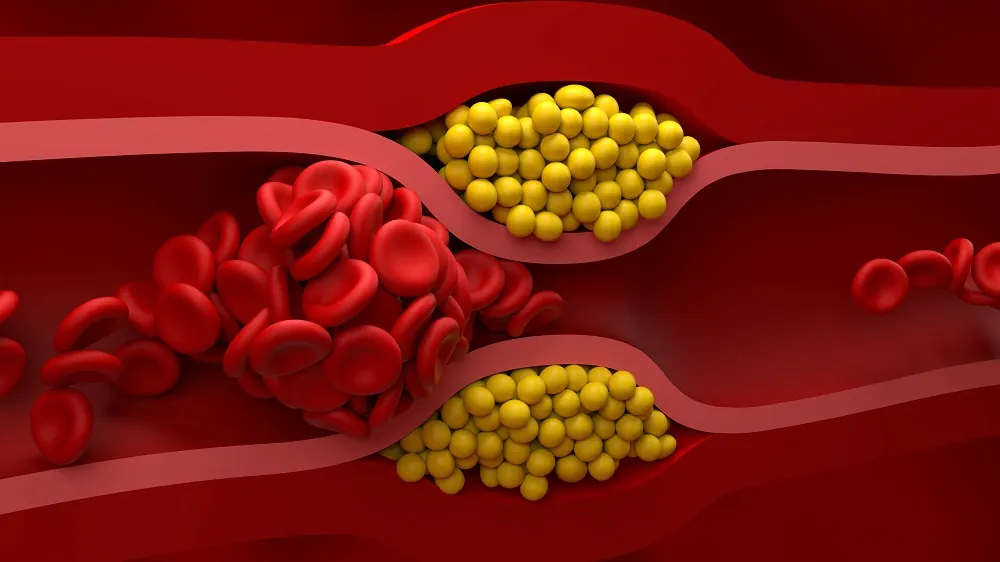Cyclarity Launches Human Trial for Atherosclerosis
- This trial builds off of initial work from LRI.

Cyclarity Therapeutics, a biotechnology company based at the Buck Institute in California, has launched its first human clinical trial.
Its primary candidate cyclodextrin drug, UDP-003, focuses on 7-ketocholesterol, an oxidized cholesterol variant that builds up in cells as we age. Atherosclerosis involves the accumulation of plaque within arteries, and it primarily results from this oxidized form of cholesterol.
Heart disease is the leading cause of death worldwide. If successful, this drug could potentially help 70 to 80 percent of people that have heart disease and are at risk of having heart attacks.
Current treatment of heart disease includes lifestyle and dietary interventions, statins, and surgery. However, these are not that effective, and there is currently no effective way to reverse the condition. If UDP-003 is a success in the coming years, it will be a game changer.
Not only will it transform how we treat heart disease, it will be a clear demonstration of how tackling the root causes of aging can lead to proper solutions to age-related diseases.
Trials and tribulations
The original plan had been to launch the trials in Cambridge, UK working with the MHRA (similar to the FDA in the USA), but, unfortunately, there were setbacks.
Regular readers may recall our last interview with Dr. Matthew O’ Connor from Cyclarity, CEO of Scientific Affairs, where he explained the delay:
The bad thing is that post Brexit, it seems that the MHRA has gotten a bit backlogged and isn’t able to keep up with our current demands on their time. It takes too long to get meetings and responses to applications currently. We’ve had to take our first human clinical trial to Australia, where it’s a faster, more streamlined, and cheaper process.
While this has led to a delay in starting trials for this potentially transformative therapy, it is great to see it finally moving forward.
Dr. Matthew O’ Connor was previously the Vice President of Research at the SENS Research Foundation for nine years (now the LRI, of which Lifespan.io is part), where initial research for what was to become UDP-003 was conducted. This trial is a proud moment for both Cyclarity and our organization.
Australia is leading the charge
This research will now take place at CMAX, a leading clinical research center in Australia, in partnership with Monash University. The trials will proceed under the guidance of Dr. Stephen Nicholls, the Director of the Monash Victorian Heart Institute in Melbourne and a Professor of Cardiology at Monash University.
In the recent Cyclarity press release, Dr. Matthew O’Connor said: “We are excited to be working with Dr. Nicholls on a groundbreaking advancement in cardiovascular care. As we advance into being a clinical stage company, Cyclarity is focused on bringing truly disease-modifying treatments for the world’s deadliest disease into reality.”
The Phase 1 clinical study will include a section featuring single ascending dose and multiple ascending dose methodologies as well as a unique segment involving 12 patients suffering from acute coronary syndrome.
This trial is intended to assess the safety of UDP-003 in patients with pre-existing plaque and to collect initial insights on its efficacy.
Cyclarity has already finished the manufacturing process for the human-quality drug material in what’s known as the Current Good Manufacturing Practice (the CGMP). They have human-grade material packaged and in sterile, single-use vials ready for patients to receive.
Thorough studies necessary for investigational new drug approval have been completed, showing no expected toxicity issues and ensuring a safe route for clinical advancement. All essential documents for trial authorization have been submitted and accepted, which means that the clinical trial should commence in the very near future.
We will be interviewing Dr. Matthew O’ Conner from Cyclarity and finding out more about this exciting development, so stay tuned for that in the next week. Finally, we wish to congratulate the Cyclarity team on this important milestone for our field. Perhaps this will lead to more acceptance of the idea that to tackle age-related diseases, we need to tackle the underlying reasons we age.







